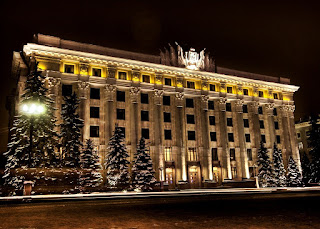 A friend questioned me the other day on the distinction between Heller's and Badiou's account of bureaucracy -- or at least the versions I fumbled out in my earlier post. As Badiou's reference is a passing one and Heller's a more systematic engagement, it is perhaps unfair to pin Badiou down to a mere phrase. But I get the feeling that he is positing precisely what Heller is arguing against.
A friend questioned me the other day on the distinction between Heller's and Badiou's account of bureaucracy -- or at least the versions I fumbled out in my earlier post. As Badiou's reference is a passing one and Heller's a more systematic engagement, it is perhaps unfair to pin Badiou down to a mere phrase. But I get the feeling that he is positing precisely what Heller is arguing against.In the lead-up to the section I quoted, Heller points out that: "All Soviet leaders, from Lenin on, regularly blamed the inefficiency of the system on bureaucracy; they launched campaigns against it, against the dimensions of paper-production, against the lack of initiative and the narrow-mindedness." (p175) Which is to say that they were the scapegoat, the whipping boy, for the endemic problems of the system itself. The centralisation of power cannot avoid bureaucracy. "The totalisation of the whole society (economy included)," she writes, "cannot function without a hierachic administation of immense dimensions.... [I]n order to realise its set aims, it needs bureaucracy." To blame bureaucracy, as I think Badiou may have been doing, is to engage in the game of the party leaders. "These charges cannot be taken seriously," Heller writes, "not because they were not true, but because they localised the source of the decay in the wrong spot."
4 comments:
Hmmm. Not read Heller, so I can't get too embroiled here, but I wonder if you've read much Moshe Lewin, and specifically The Soviet Century. He makes a distinction between the nomenklatura and the party that seems to be useful here. The former is what really has power, and the party is its public face and its 'clapping machine' as he puts it - which is nevertheless inclined to get ideas above its station. This could be safe and purely rhetorical (eg under Brezhnev); could take the form of terror against the party (eg under Stalin); and could genuinely threaten the whole construction altogether - one shouldn't forget that Hungary in 1956 represented to a large extent much of the Party siding with the working class against the secret police and the bureaucracy.
Thanks, Owen. I'm just getting started on the "Soviet studies". Trying to make my way through the thicket, avoiding the obviously Cold War-motivated stuff (all those parallel conversations don't make for much good scholarly reading now). I hadn't come across the Lewin, but it should now be arriving on my doorstep any day. Thanks for the tip.
Heller certainly makes this distinction too, but I don't think she's as definitive about it as Lewin seems to be. I don't have the Heller book right here, but she talks in one section about how power is variegated above and below. The mid-level bureaucracy banding together against pressure from above (i.e. upper nomenklatura and Party), then disbanding to mete power below (i.e. subjects and lower-level bureaucrats). Which may just be another localised example of what Lewin's describing...
Hungary in 1956 is likely to be one of the case studies in my final writing. It's a fruitful point of condensation (in an only semi-psychoanalytic sense) for analysing these structures and their effects/responses. The endlessly contested nature of the way it's commemorated/memorialised/forgotten in contemporary Hungary is fascinating too.
I'm sure it is more than a straight division. (but then I'm more than a bit of a Deutscherite, and tend to think these things were unstable and contested right up to the end and that the outcome was by no means inevitable...not the most popular of positions nowadays for obvious reasons)
So what is the thesis on? As much as one can ever explain until the thing is written...Mine is at least supposed to have a big Sovietology component (although is currently rather on hold due to a pregnant supervisor)
Firstly, Heller is all for the ever-changing, kaleidoscopic nature of these divisions/distinctions. They talk in the book of the "Kruschevian intermezzo" -- a phrase probably more evocative and operatic feeling than the historical experience of that time, I imagine. Which is, obviously, distinguished from the times either side of that etc etc.
Secondly, the long and winding road this thesis thing is headed towards is a stunning, world-altering conclusion about recent nostalgia for communism in the former East.
I've been through various phases of ambitiousness (Eastern nostalgia + the crisis of the Western left since 1991!) and narrowness (nostalgia in German-Polish bordertowns as embodied in everyday practices of club-footed 28-33yo farmhands, y'know, like, for instance). I'll probably end up talking about Goodbye Lenin!, Vladimir Putin and a few other semi-thoughts I'd had in the past three or so years.
I'm currently in the process of writing a presentation to be made to my supervisors, outlining my progress so far. In this, I hope to have nailed down some of the structure -- which has all been a touch free-floating to this point.
I'm trawling through the Sovietology to get a grounding in the nature of Soviet (and Central & Eastern European Communist) socialisation. The tentative conclusion suggests that the pairing of totalitarian Communist socialisation and neo-liberal insecurity is legible in the nostalgic sentiments of both left (Communist, socialist) and right (neo-Nazi, nationalist). Which is not the same thing as the old "it's the lost paternalism, stupid" explanation...
No doubt this could -- and will! -- be formulated better, but this comment box is fairly uninspiring as far as erudition and writerly flair go.
Post a Comment